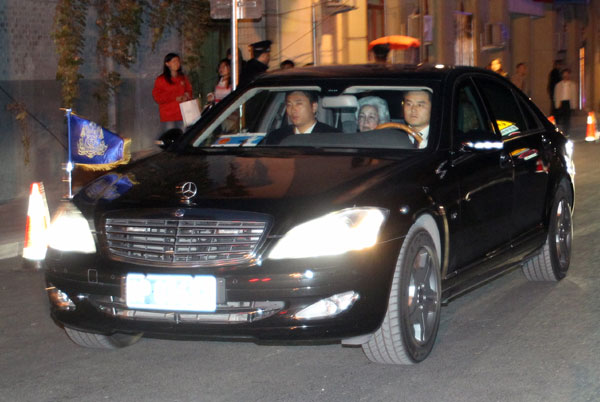"The friendship between Sihanouk and the Chinese leaders originated at the 1955 Bandung Conference, when he held private meetings with Premier Zhou Enlai," said Hong Lin, a guest commentator on China Central Television.
Fu Xuezhang, a former Chinese ambassador to Cambodia who had known Sihanouk for decades, said the former king, in common with many Western leaders of the time, had misgivings about communist China before the Bandung Conference. However, after listening to Zhou's conference speech, Sihanouk decided to communicate with China and even help the country to gain diplomatic recognition.
Sihanouk visited China twice in the late 1950s, meeting with Mao Zedong on both visits. In August 1958, the two nations established diplomatic relations, and Sihanouk sent three of his sons to study in China in the 1960s.
In 1970, a US-backed coup sent Sihanouk, who by then had taken the title of 'prince', into years of exile in Beijing. "I've always considered China as my second homeland ... only China has supported us, the Khmer resistance. The Soviet Union does not want us," he said in 1971.
 |
|
Queen Mother Norodom Monineath Sihanouk arrives at the Beijing Hospital to accompany her husband's body back home. Wang Jing / China Daily |
Many Western observers considered the alliance between a monarch and China's revolutionaries to be a strange union, but Mao Zedong was typically forthright about the relationship: "Some say that communists do not like princes, but we Chinese communists like and esteem a prince like Norodom Sihanouk, who is so close to his people, who are loyal and devoted to him."
The Khmer Rouge seized power in 1975, and when Sihanouk returned to Cambodia he was detained and his execution was ordered. Only the personal intervention of Zhou saved his life.
Vietnam invaded Cambodia in December 1978 and toppled the Khmer Rouge a few weeks later. China arranged for Sihanouk to escape from Phnom Penh later that year, and he went into exile once again, in Pyongyang and Beijing. In 1993, Sihanouk became the king of Cambodia for the second time.
The long friendship between China and Sihanouk was highlighted in 2009 by the 87-year-old former ruler's presence, next to President Hu Jintao, at a reception to celebrate the 60th anniversary of the founding of the People's Republic of China, according to Hong Lin.
Devotion, donations
"In those years, the Sihanouk couple donated disaster relief funds to China almost every year, between $50,000 and $100,000 each time", wrote former Assistant Foreign Minister Hu Zhengyue in the Chinese magazine World Affairs earlier this year.
"The Cambodian royal family is not so rich, but they did so (donate) not only to show the friendship between China and Cambodia, but also to somehow 'repay' China."
Hu added that he was always warmly received by the "refined and courteous couple" whenever he visited them.
"What Sihanouk would say every time was that he would surely have died a long time ago if he had not received care from Chinese leaders of different generations and the Chinese government, and the meticulous treatment at the Beijing Hospital.
"He stood by Chinese people's side at many important points in history, and on major issues of principle, and offered strong support. Speaking frankly, the current favorable ties between China and Cambodia are the result of Sihanouk's influence", commented Hu.
After stepping down as leader, Sihanouk encouraged closer ties between the leaderships of the two countries, said Fu Xuezhang, a former Chinese ambassador to Cambodia. In partial recognition of Sihanouk's feelings toward China, Phnom Penh continues to give full support to China in international affairs, he said.
Life after Sihanouk
"Alternately charming and ruthless, he dazzled world leaders with his political wit and, in the process, raised the stature of his small Southeast Asian nation," the New York Times commented on Monday.
"In fact, he skillfully manipulated the great powers, usually with the support of China, to ensure his survival, as well as his country's independence," according to the newspaper.
Song Yinghui, a researcher in Southeast Asian studies at the China Institute of Contemporary International Relations, said China's equal and sincere support gave Cambodia more diplomatic clout during the Cold War, while Chinese aid and the development opportunities provided by China is key for Cambodia.
China is now Cambodia's largest foreign investor. In 2011, the bilateral trade volume was almost $2.5 billion, a 73.5 percent surge on the previous year.
Besides, a stable and thriving China, and Southeast Asia generally, is in the interests of Cambodia, which has suffered from political turbulence, Song noted.
One example of the friendship between the countries is Cambodia's efforts to mediate at a meeting of the Association of Southeast Asian Nations in July. The move prevented the 10-nation group from agreeing on a paragraph about territorial disputes in their joint communique that could further escalate regional tensions. Cambodia currently holds the rotating ASEAN presidency.
"The Western media said Cambodia's efforts came at the behest of China, but the logic is not that simple," Song said. "After decades of turbulence, the Hun Sen administration is now following a pragmatic path and attaches great importance to independence and regional stability," said Song.
"So, in the days without Sihanouk, there are many reasons to believe that China and Cambodia will maintain the close ties they have held over many decades"
